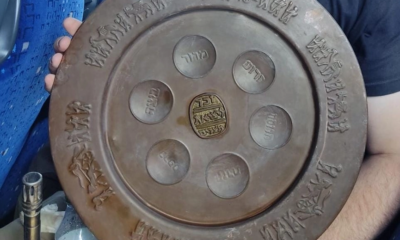
Israel

World starved of facts around aid to Gaza
Israel is accused by Palestinians and international entities of starving Gazans despite the humanitarian aid Israel is helping to get into the Gaza Strip since the beginning of the Swords of Iron war on Hamas. The truth is that the forces operating in the Palestinian arena are deliberately obstructing the aid. There’s a holistic solution to this problem.
Eight years before Swords of Iron, I was the commander of Operation Good Neighbour, on the Israel-Syria border between 2016 and 2018, which was considered the longest and most successful humanitarian operation ever carried out by Israel. During the operation, 700 humanitarian aid missions delivered thousands of tons of aid such as medical equipment, food, and more to a Syrian area inhabited by about 250 000 people.
Additionally, about 6 000 Syrian patients and injured individuals, including 1 400 children, were treated in Israeli hospitals, and various projects were supported beyond the border, such as the establishment of a field clinic and more.
In contrast, during Swords of Iron, Israel allowed the transfer of a significantly larger amount of humanitarian aid into the Gaza Strip, a region home to just more than two million people. For example, from the start of the war until June 2024, more than 507 000 tons of food has been delivered to Gaza.
The external factors operating in Gaza that contribute to the creation of negative narratives against Israel are as follows:
Politics: this relates to the Palestinian narrative of the struggle against Israel and the desire to create an image of misery and victimhood. Despite the traditional hostility between the leadership of the Palestinian Authority and that of Hamas, the Palestinian authorities operate in parallel to echo narratives of “Israeli occupation” on the one hand and the legitimacy of “resistance” on the other.
This aims to delegitimise Israel among opinion leaders worldwide and citizens in Arab and Western countries. Throughout the world, massive demonstrations in support of the Hamas terrorist organisation are being held on the streets and on campuses, relying on well-marketed slogans and edited videos that evoke sympathy. They also contribute to damaging Israeli legitimacy and lead to actions against the country on international and civil levels.
Distribution of humanitarian aid by Hamas primarily to its affiliates. This leaves much of the needy population without aid. As part of the directive to create a deliberate crisis, Hamas’s interest is, of course, to create a false impression of starvation.
Though Hamas does provide for the population in Gaza, it prioritises aid to those perceived as loyal to the organisation – members of the military and civil wings and their families – before being distributed to the broader Gazan public.
Additionally, it should be noted that Hamas and other terrorist organisations fire at border crossings between Israel and the Gaza Strip and surrounding areas, particularly the Kerem Shalom crossing.
These targeted attacks are intended to disrupt crossing operations and lead Israel to close them.
Then, with unfathomable hypocrisy, Hamas raises the tone of lamentation, accusing Israel of “starvation” and not allowing aid into Gaza.
The presence of United Nations (UN) entities operating in Gaza with significant sympathy with the Palestinian public. Various UN organisations, particularly UNRWA (the United Nations Relief and Works Agency for Palestine Refugees in the Near East), which are intended to aid Palestinians, have over the years become almost entirely controlled by Hamas.
UNRWA, one of the largest employers in Gaza with most of its staff being locals, has become a significant employment source for Hamas members. As was exposed during the Swords of Iron war, some of its employees were in fact military operatives of the organisation.
Beyond the political issues surrounding UNRWA, the organisation also fails to fulfil its responsibility to distribute necessary food supplies. Part of this failure stems from the fact that it hasn’t managed to adapt to wartime conditions which require different mobility capabilities than routine times.
Thus, it can be understood that it doesn’t matter how many aid trucks are sent into the Gaza Strip or how many COGAT (Co-ordinator of Government Activity in the Territories) announcements are distributed on the subject. The overarching interest of the Palestinians is to continue to create a false impression of starvation.
They understand the high sensitivity of this issue in Western consciousness and the ability of the masses in the West and in Arab countries to empathise with this supposed suffering.
What can be done, and how can the success of an operation in a different time and arena be applied to a similar situation in the Palestinian arena? In my understanding, a significant element missing in Israel’s approach to the humanitarian situation is a holistic response.
Over the years – and unfortunately today – the humanitarian response is perceived as a problem for COGAT rather than the entire defence establishment or the Israeli government as a whole.
This means that although the IDF (Israel Defense Forces) is certainly involved in the complex co-ordination of humanitarian aid delivery, it remains a purely technical involvement.
In contrast, Operation Good Neighbour was a humanitarian aid operation that was part of a comprehensive operational concept developed by the Bashan Division. It was accompanied by countless additional actions to reinforce and embed the messages we wanted to convey to the Syrian population.
Today, the Israeli system in the context of Gaza seems to be fighting windmills. COGAT’s publications and the IDF spokesperson’s videos on the subject fail to combat the Palestinian narrative and slogans surrounding this issue.
In this context, it’s appropriate for Israel to develop a comprehensive system of significant information mechanisms surrounding the issue of humanitarian aid delivery.
This should include a structure that relentlessly promotes these messages – from the quantities of aid to Hamas corruption, to the lack of shortages in the markets, and so on.
To translate this statement into practical terms and be highly effective, it’s necessary to engage IDF spokespeople fully in all languages and involve Israeli state mechanisms – government ministries, pro-Israel organisations, and influencers who are prominent on social media – to post content countering Palestinian claims on these issues.
Additionally, it’s important to place interviewees on international networks to articulate the issue of humanitarian aid in all languages. They need to point out the difficulties and obstacles that the Palestinian side presents for aid delivery; echo messages on social media through advanced influential methods; and conduct psychological operations campaigns on the subject. These and other measures can change the situation significantly.
Despite the objective complexity of the situation, we need to create a comprehensive approach well-versed in the data and capable of presenting it on various platforms to as broad and diverse an audience as possible. This will constitute a refreshing change in a battle which we have seemingly been losing from the start.
Unfortunately, much of these activities are carried out voluntarily by various social media influencers rather than as part of an overall, integrated operational plan.
- Lieutenant Colonel (Reserves) Eyal Dror served in the IDF for 24 years, most of which were with COGAT.










